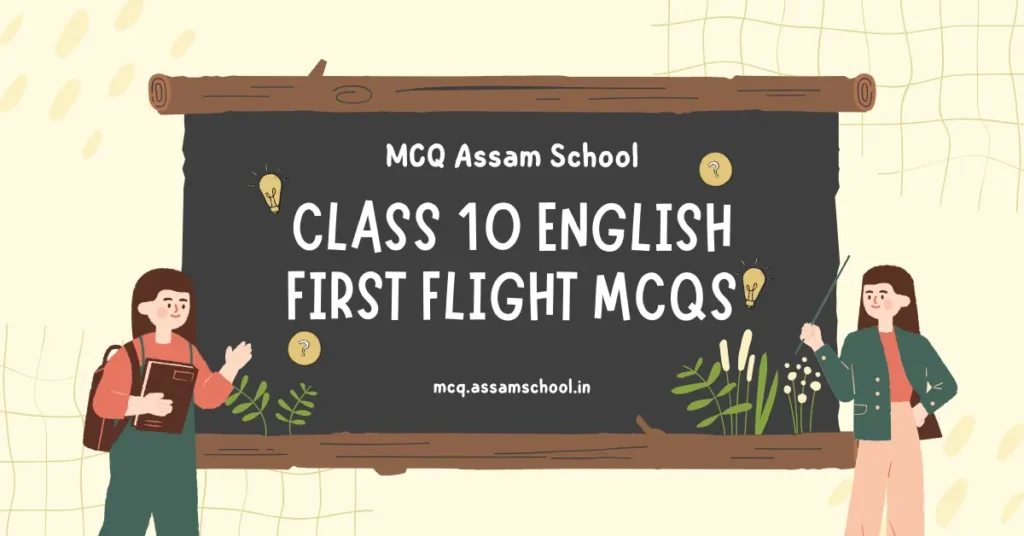This blog post offers a comprehensive MCQ guide for Class 10 English First Flight (NCERT syllabus). It includes 30 questions per chapter for all nine chapters. Students can practice online, receive instant feedback, and review correct answers. The post explains the importance of MCQs, provides study tips, and suggests additional resources. It aims to help students prepare effectively for their exams.

Are you a Class 10 student looking to test your knowledge of English First Flight? You’re in the right place! This blog post offers a complete set of Multiple Choice Questions (MCQs) based on the NCERT syllabus. Let’s explore how you can practice and improve your understanding of this important subject.
Why MCQs Matter for Class 10 English
MCQs are a crucial part of your exam preparation. They help you:
- Quickly review key concepts
- Identify areas that need more study
- Get familiar with question formats
- Improve your time management skills
Our MCQ Collection
We’ve created a comprehensive set of MCQs covering all nine chapters of First Flight. Here’s what you’ll find:
- 30 questions per chapter
- Four options for each question
- Only one correct answer per question
- Instant feedback on your answers
How to Use This Resource
Follow these steps to make the most of our MCQ collection:
- Choose a chapter to focus on
- Answer all 30 questions
- Click the submit button at the end
- Review your score
- Check the correct answers (green checkmarks)
- Identify incorrect answers (red cross marks)
- Use this feedback to guide your further study
Chapter-by-Chapter Breakdown
Let’s take a quick look at each chapter covered in our MCQ sets:
| Chapter No. | Chapter Name | MCQs |
|---|---|---|
| Chapter 1 | A Letter to God | 30 MCQs on A Letter to God |
| Chapter 2 | Nelson Mandela, Long Walk to Freedom | 30 MCQs on Nelson Mandela, Long Walk to Freedom |
| Chapter 3 | Two Stories About Flying | 30 MCQs on Two Stories About Flying |
| Chapter 4 | From the Diary of Anne Frank | 30 MCQs on From the Diary of Anne Frank |
| Chapter 5 | Glimpses of India | 30 MCQs on Glimpses of India |
| Chapter 6 | Mijbil the Otter | 30 MCQs on Mijbil the Otter |
| Chapter 7 | Madam Rides The Bus | 30 MCQs on Madam Rides The Bus |
| Chapter 8 | The Sermon at Benares | 30 MCQs on The Sermon at Benares |
| Chapter 9 | The Proposal | 30 MCQs on The Proposal |
Benefits of Online MCQ Practice
Practicing MCQs online offers several advantages:
- Convenience: Study anytime, anywhere
- Immediate feedback: Know your strengths and weaknesses instantly
- Progress tracking: Monitor your improvement over time
- Exam simulation: Get comfortable with digital test-taking
Tips for MCQ Success
Here are some strategies to help you excel in MCQs:
- Read each question carefully
- Eliminate obviously wrong answers
- Look for keywords in the question
- Don’t spend too much time on any single question
- If unsure, make an educated guess
- Review your answers before submitting
How These MCQs Prepare You for Exams
Regular practice with our MCQs will help you:
- Reinforce important concepts
- Improve your reading comprehension
- Enhance your critical thinking skills
- Boost your confidence for the actual exam
Additional Resources
To further support your English studies, consider:
- NCERT textbooks and solutions
- Online study forums
- Educational YouTube channels
- Practice papers from previous years
The Bottom Line
Mastering Class 10 English First Flight requires dedication and smart study strategies. Our chapter-wise MCQs provide an excellent tool for self-assessment and exam preparation. Remember to use this resource regularly, along with other study methods, to achieve your best results.
We wish you the best of luck in your studies! Feel free to revisit this page anytime you need to sharpen your First Flight knowledge.
